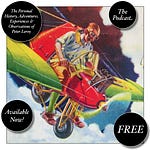A CURIOUS KIND of cottage industry sprang up in the sunny room behind the Mikszaths’. During the day, while Herb was away, Lorna would work for a couple of hours at a little folding work table that Herb built for her. Building the table had been a labor of love, two loves: love of Lorna and love of tinkering. Along the back of the table, in tiers, were small bins that held all of Lorna’s tools and supplies, and this entire section pivoted when the table was collapsed, so that nothing would spill, since the bins were always level, whether the table was open for work or folded to stand against the wall. During the day, while Herb was away, Lorna would unfold the table and spend three or four hours at work. She would begin by spending a little while working on innocent carvings, delicate rose blossoms or sinewy horse heads that would be used for expensive sets of links and studs but that served primarily as decoys. She spent most of her time on the exacting work of carving the intricately articulated figures that went into the animated coarse goods that were becoming known as “Watchcase Wonders” and were, though Lorna didn’t know it, making Luther a wealthy man.
It would have been impossible for Herb to find time or a place to work on his designs if it hadn’t been for his meeting Garth Castle. Garth was at the time a young man to watch at Babbington Clam. He was tall, wiry, and handsome, and though he was only three years older than Herb, he had about him an air of worldly sophistication that made him seem much older. This air was only an air — Garth had been born in Hargrove, the next town, and had never traveled farther from Hargrove than New Jersey. To give himself the air, he drew on his imagination and his careful observation of men who seemed to him to be truly worldly and sophisticated. Some actually were; others were merely successful at business, and that only on a local scale.
Garth wanted to be, in Babbington, a New York gentleman, or what he took to be a New York gentleman. He behaved as he supposed one would if he were, for reasons unknown but probably just a little bit scandalous, rusticating in Babbington. He succeeded admirably. Success in this pretense brought Garth confidence and a relaxed style, and in time he appeared so at ease in the role he’d written for himself that he seemed to many Babbingtonians to be a man making the best of having been banished to Babbington, a man who’d risen above being resigned to his lot and was now — and with what grace! — actually enjoying it. He was a model for every ambitious young man in town.
Herb attracted Garth’s attention by designing a new culling table. Formerly, the culling table had been nothing more than a large wooden table, about waist height, covered with a sheet of zinc, placed in front of an opening in the bin into which the clams were dumped like so many lumps of coal. Cullers stood alongside the table, and one of them, the “doorman,” slid a small wooden door upward, releasing clams from the bin. When the table was covered with clams, the doorman, with great difficulty, slid the door down again, and the cullers began work. Each sorted the clams that came immediately to hand, tossing them according to size, without looking backward, into crates arranged along the walls behind the cullers. This method had many faults: the doorman’s job was difficult and frustrating; the cullers often interfered with one another, straying across poorly defined boundaries in their zeal to cull; and, though the cullers were (after much training and practice) very good at getting the clams into the crates without looking, and even knew from the sound of the clams clattering against their crated fellows how nearly full a crate was, clams often collided in midair and ricocheted into the wrong crates, and the concussion of one clam against another, in the air or in the crate, occasionally cracked or crushed them.
Herb was intrigued by the problems the table presented. He began lingering in the carpentry shed after work to put in some time on an idea he had for an entirely new kind of culling table. He worked alongside one of the carpenters, Andrew “Swifty” Switt, to build it. When it was finished, he and Switt installed it one night in place of the old table.

In Topical Guide 309, Mark Dorset considers Life: As an Imitation of Art and Art: As an Inspiration for Life from this episode.
Have you missed an episode or two or several?
You can begin reading at the beginning or you can catch up by visiting the archive or consulting the index to the Topical Guide.
You can listen to the episodes on the Personal History podcast. Begin at the beginning or scroll through the episodes to find what you’ve missed.
You can ensure that you never miss a future issue by getting a free subscription. (You can help support the work by choosing a paid subscription instead.)
At Apple Books you can download free eBooks of “My Mother Takes a Tumble,” “Do Clams Bite?,” “Life on the Bolotomy,” “The Static of the Spheres,” “The Fox and the Clam,” “The Girl with the White Fur Muff,” “Take the Long Way Home,” “Call Me Larry,” and “The Young Tars,” the nine novellas in Little Follies, and Little Follies itself, which will give you all the novellas in one handy package.
You’ll find overviews of the entire work in An Introduction to The Personal History, Adventures, Experiences & Observations of Peter Leroy (a pdf document) and at Encyclopedia.com.














Share this post